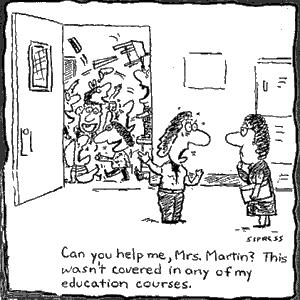 Lack of quality in schools is currently in the media spotlight. Parents are looking for schools they can trust. Many families are deciding to leave their neighborhood schools in search of a school that provides a challenging curriculum while simultaneously addressing the emotional, physical, and social needs of its student population. They are looking for a great school. There are many great schools, but not all of them use the same formula for success. A single recipe for greatness does not exist. However, the following characteristics will help contribute to the success of any school. 1. High expectations for the students and teachers An all inclusive climate of high expectations and quality (not quantity) is expected , and anything less is unacceptable. Having a passion for excellence is an impelling force that should be present each day. A great school has motivated teachers that consistently encourage their students do their best. 2. Dedicated teachers and administration The best teachers are lifelong learners. They continually participate in professional development opportunities, observe co-workers in their classrooms, attend grade level teacher meetings, and improve upon their digital literacy. Teachers collaborating across disciplines and grade levels is also beneficial. For example, a former 4th grade class of mine created family crests to coincide with their social studies unit covering Culture and Heritage. Principals/Heads of School must ensure that professional development is incorporated into the school's culture. A joint effort with teachers will provide improvement and expeditious learning for the entire student population. In addition, classroom environment (e.g. non-traditional arrangement of desks) also enhances collaboration. Research has shown that teachers are more effective, efficient, and happy when they have sufficient time to plan, problem solve and collaborate. Generally, teachers in the highest achieving countries are given significant time to work together to create a pervasive environment of high expectations. 3. Principal's/Head of School's presence The leader of a school should plan to be visible throughout the campus on a daily basis. Examples include (but are not limited to) greeting students as they arrive to school, unscheduled, brief classroom observations (noting student & teacher strengths, asking for clarification and making suggestions), participating in a game during recess, having lunch with students and staff, or covering playground duty for a teacher. This visibility fosters comfort and familiarity and will improve their relationships with the entire school community. 4. Prioritize To be a successful (great) school, the priorities need to be in order. The following components should be at the top of any school's list of priorities.
A school that is designed this way cultivates a sense of gratification and optimism and establishes a great school! What makes your school great?
0 Comments
A fear new and/or experienced teachers often have during their career is an out of control classroom. I was going to write a blog about this myself, but stumbled upon a great post about five common mistakes that can lead to your classroom getting out of control. Thank you Linda Kardamis! Click here to read!
Are you having difficulty with some of your classes? Perhaps you are doing well but would like to do better? By improving in school you will boost your self-confidence, impress your teachers and parents, and have a better chance at being admitted to the school of your choice. Here are 11 ways one can become a better student.
1. Sit in front of the class. There is no reason to sit at the back. Arrive early, sit in a seat in the front row (or within the first three rows). This will show that you are interested in doing well. 2. Find a quiet space to do school work. Do your work in the library (or a quiet room at home) to limit distractions. If you are in the school library or public library, select a table that is not located near high foot traffic areas. 3. Treat it like a job. Work hard from the time your first class starts until the last class of the day ends. 4. NEVER skip class. Nothing takes the place of being in class and absorbing all that is being taught. If you copy a friend's/classmate's notes, you will only get the information they absorbed (which may not be that much). Be responsible for your education...go to class. 5. Go to office hours (high school). If you have questions or comments about a class, take advantage of your teacher's office hours. It can only help you. Upper elementary students be sure to visit your teacher before school starts, during the lunch hour (if they are on campus), or briefly after school. 6. Ask questions and participate during class. Don't settle for being a passive learner. Actively participating makes one's learning experience much more interesting and rewarding. 7. Exercise, eat well, and get plenty of sleep. These are all important factors in your success as a student. 8. Take notes in class, and keep them organized. Rewriting those notes each night will utilize the kinesthetic modality of learning to help you understand the material. 9. Do your homework and review your notes each night. This will eliminate the need to cram for tests. 10. Utilize flashcards as a tool for studying. Try quizlet.com. It is a great resource for creating digital flashcards. If you prefer, use the old school method of creating flashcards on 3 by 5 index cards! 11. Start any long term projects soon after they are assigned. Make a schedule regarding when you will have certain components of the project completed. This will allow for ample time to check your project to ensure all requirements are completed before the project is due. |
AuthorRandy Sally Archives
June 2023
Categories
All
|



 RSS Feed
RSS Feed
